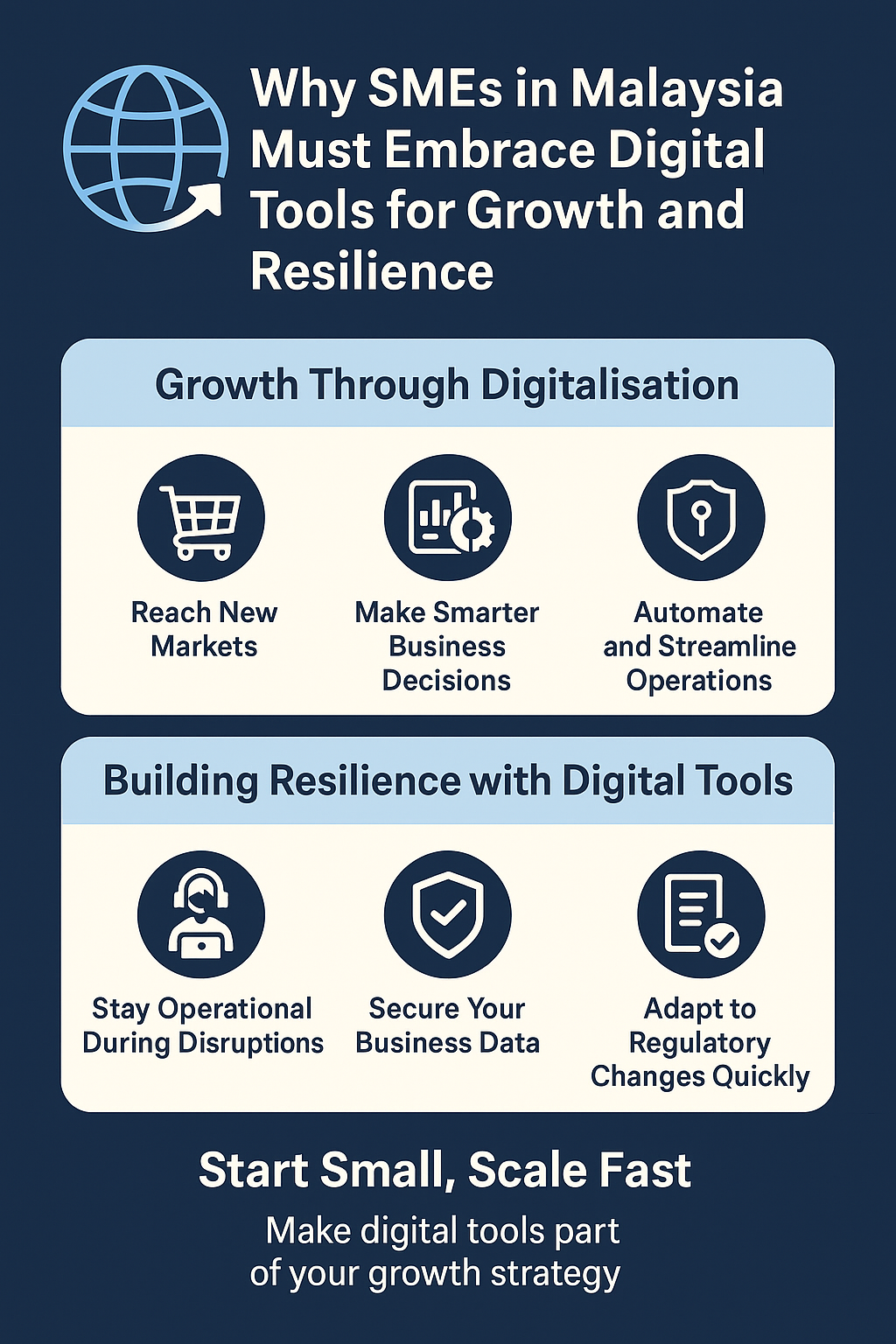This post is also available in:
Bahasa Malaysia
Digitalisation is no longer optional
It’s essential for survival and success.
In today’s fast-changing business environment, small and medium-sized enterprises (SMEs) in Malaysia face growing pressure to stay competitive, efficient, and adaptable. The COVID-19 pandemic, global supply chain disruptions, and rising customer expectations have all shown one thing clearly: businesses that embrace digital tools are more resilient and better positioned for growth.

Growth Through Digitalisation
1. Reach New Markets With digital tools like e-commerce platforms, social media marketing, and digital payments, SMEs can tap into local and international markets with minimal investment.
Whether you’re selling handmade goods or professional services, going digital means expanding your customer base beyond geographic limits.
2. Make Smarter Business Decisions Cloud-based accounting and business intelligence tools give real-time visibility into your finances and operations.
You no longer need to wait for your monthly reports—you can track performance daily and adjust strategies instantly.
3. Automate and Streamline Operations Digital tools automate repetitive tasks like invoicing, inventory tracking, payroll processing, and customer communication.
This frees up time for business owners and staff to focus on value-added work, such as product development or customer service.
Building Resilience with Digital Tools
1. Stay Operational During Disruptions During the MCO periods, businesses that had already moved to cloud solutions could continue operations from home. Digital tools enable remote work, online collaboration, and access to data anytime, anywhere.
2. Secure Your Business Data With proper digital infrastructure, your business data is backed up and protected. Cloud-based systems have built-in security protocols far stronger than traditional setups.
3. Adapt to Regulatory Changes Quickly Whether it’s SST compliance, EPF/SOCSO updates, or e-invoicing rollout, digital tools help you adapt without disruption. Many cloud-based accounting and payroll solutions in Malaysia update automatically to stay in sync with local regulations.
Real-World Impact
Many Malaysian SMEs that embraced digital tools early reported:
- 20–30% reduction in administrative workload
- Faster payment cycles and improved cash flow
- Improved customer satisfaction through faster response and service
- Better employee retention through digital HR and payroll systems
Start Small, Scale Fast
You don’t have to digitize everything overnight. Start with high-impact areas like:
- Cloud Accounting
- Cloud Payroll
- Online Payments
- Digital Marketing Platforms
Then, gradually expand to include CRM, etc
Final Thoughts
As Malaysia moves deeper into the digital economy, supported by initiatives like MyDIGITAL, DEFA, and SME Digitalisation Grants, now is the time to make digital tools part of your growth strategy.
Don’t wait for a crisis to force change—be proactive and future-ready.
If you’re unsure where to begin, talk to an advisor or reach out to an accounting/payroll consultant who understands cloud systems tailored for SMEs. It’s one of the best investments you can make for your business.

The Impact of Unprecedented Technological Change on Small Business Finances
In recent years, the pace of technological innovation has accelerated at an unprecedented rate, disrupting industries and transforming the way businesses operate.
For small businesses, this rapid evolution is particularly significant in how they manage their finances.

Digital Economy Framework Agreement
With the rise of the Digital Economy Framework Agreement (DEFA), the government is paving the way for a more connected, innovative, and competitive digital economy across ASEAN. What is DEFA and how does it directly impact – and benefit – small businesses, especially those ready to adopt cloud-based accounting and payroll systems.